
Italian postcard by NMM, Milano, 1941. Caption: Maria Denis, a gracefully enigmatic-looking woman, an actress with lively performances.

Italian postcard by B.F.F. Edit. (Casa Editr. Ballerini & Fratini, Firenze), no. 2070. Photo: Ghergo.

German postcard by Film-Foto-Verlag, no. G 205. Photo: Alfa.
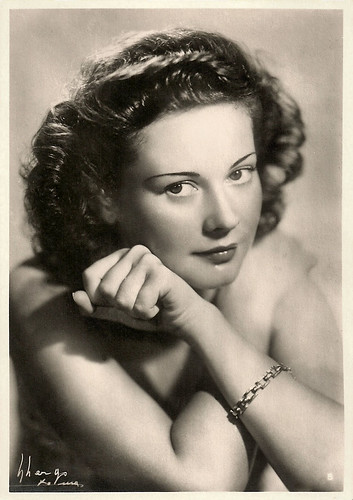
Italian postcard by ASER, 1941. Photo: Ghergo, Roma.

Italian postcard by NMM, Milano. Caption: Maria Denis - Sweetness, naivety of expression; composure, balance, the naturalness of interpretation.
Telefoni Bianchi
María Denis was born Maria Esther Beomonte in Buenos Aires, Argentina, in 1916. Her parents were Italian and her sister was the actress Michela Belmonte. María moved to Italy when she was 3 years old.
She was still attending high school when she was discovered by the cinema. At 16, she started her career with the film La telefonista/The Telephone Operator (Nunzio Malasomma, 1932) featuring Isa Pola. She then played a small part in the comedy Gli uomini, che mascalzoni!/What Rascals Men Are (Mario Camerini, 1932), which launched Vittorio De Sica as a debonair film star.
She played her first lead in Treno Popolare/Popular Train (Raffaelo Matarazzo, 1933), a typical Italian-style comedy about Sunday train trippers from Rome to Orvieto. In 1934 she had her breakthrough with the film Seconda B/Second B (Goffredo Alessandrini, 1934) as a flirtatious adolescent, who plays a cruel joke on her young professor. The film was a huge success and it was followed by more roles that made her a star of the Telefoni Bianchi cinema: a typical Italian genre of bourgeois comedies with elegant sets that featured white telephones.
She appeared in the roles of a foundling, chamber maid or young teacher, and worked with such famous Italian directors of the period as Guido Brignone, Mario Camerini and Alessandro Blasetti. For the latter, she appeared in 1860 (Alessandro Blasetti, 1934), his film about Garibaldi's expedition, and in his Contessa Di Parma/The Duchess of Parma (Alessandro Blasetti, 1937).
According to John Francis Lane in his obituary of Denis in The Guardian, Blasetti mixed in this film ”not very successfully, the worlds of soccer and fashion”. Another popular film of the “brunette with a perky Latin temperament” was the nostalgic musical Napoli d'altri tempi/Naples in the Past (Amleto Palermi, 1938) with Vittorio De Sica.

Italian postcard by Rizzoli, Milano, 1936.

Postcard by Agfa.
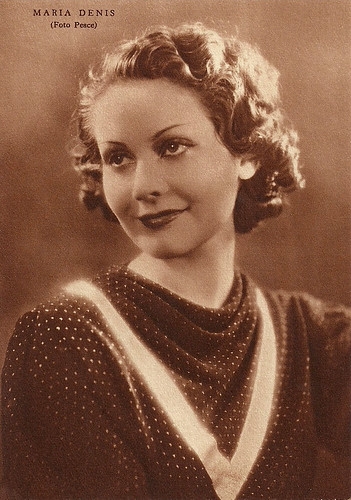
Italian postcard by Rizzoli, Milano, 1938. Photo: Pesce.

Italian postcard by Rizzoli, Milano, 1939, for Orologi e Cinturini Delgia. Photo: Venturini.
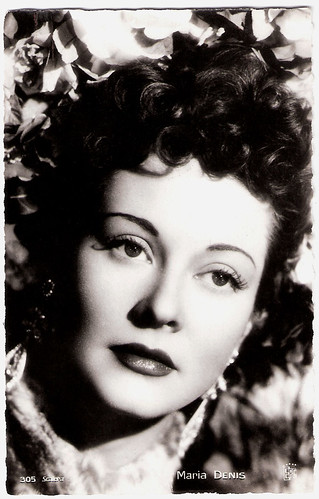
French postcard by EPC, no. G 305. Photo: Scalera.
Mussolini Cup
During the war, María Denis appeared with Fosco Giachetti in the Fascist propaganda film L'assedio dell'Alcazar/The Siege of Alcazar (Augusto Genina, 1940), about the besieged inhabitants of the fascist citadel in Toledo during the Spanish civil war. She played a Spanish girl whose soldier boyfriend is killed during the fighting. The film won the Mussolini Cup, the top prize at the 1940 Venice Film Festival, and one of the reviewers, who found much to praise in the film, including her performance, was Michelangelo Antonioni.
Very popular were Addio giovinezza!/Farewell, youth! (Ferdinando Maria Poggioli, 1940) set among students in Turin, La maestrina/The schoolmarm (Giorgio Bianchi, 1942) and Sissignora/Yes, Madam (Ferdinando Maria Poggioli, 1942). Denis proved her versatility when she played with great sensitivity and refinement a blind girl in Le due orfanelle/The Two Orphans (Carmine Gallone, 1942) alongside Alida Valli.
She also starred in foreign productions like the French film La vie de bohème/La Bohème (Marcel l'Herbier, 1942-1945) opposite Louis Jourdan. At this time she met director Luchino Visconti and in her own words, she fell madly in love with the handsome, cultured aristocrat. When Anna Magnani had to pull out of what was to be his first film, Ossessione/Obsession (Luchino Visconti, 1942), Maria hoped that she would get the part, but the director preferred Clara Calamai.
Though probably aware of his homosexuality, Maria Denis continued to pursue Visconti. In 1944, during the Nazi occupation of Rome, she was linked to Pietro Koch, the notorious Roman police chief. In 1946, while she was shooting the film Cronaca Nero/Black Chronicle (Giorgio Bianchi, 1947), Maria Denis was arrested as a collaborator and kept at the police headquarters in Rome for fourteen days.
At her trial, Maria Denis succeeded in convincing the court that she had only taken advantage of Koch's infatuation to help anti-fascists get released, in particular Luchino Visconti. Visconti had been arrested and imprisoned for political sympathies closely linked to the partisans. She was subsequently acquitted.

German postcard by Film-Foto-Verlag, no. A 4084/1, 1941-1944. Photo: DIFU.

Italian postcard by B.F.F. Edit. (Casa Editr. Ballerini & Fratini, Firenze), no. 2069. Photo: Ghergo.
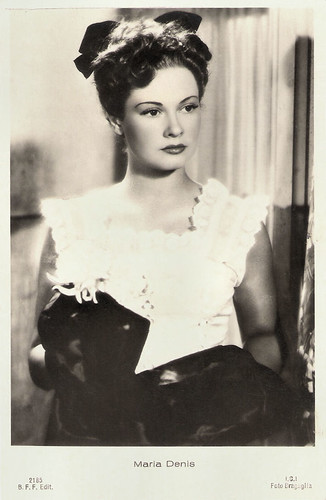
Italian postcard by B.F.F. Edit. (Casa Editr. Ballerini & Fratini, Firenze), no. 2185. Photo: Bragaglia / I.C.I.
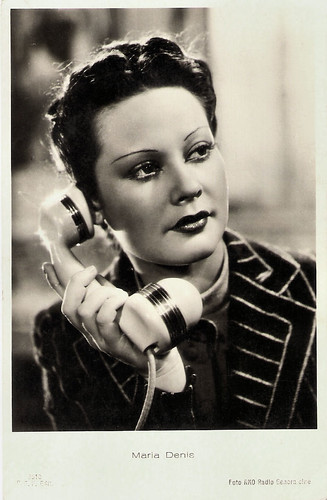
Italian postcard by Casa Editr. Ballerini & Fratini, Firenze (B.F.F. Edit.), no. 2510. Photo: RKO Radio Genera Cine.

Italian postcard by Casa Editr. Ballerini & Fratini, Firenze (B.F.F. Edit.), no. 3890.
Tarnished and bitter
Whether it was true or not that María Denis did in fact become Pietro Koch's lover either before or after Luchino Visconti´s arrest has never been confirmed. However, her film career was tarnished.
After the war, she only found a few film parts, like in Peter Ustinov's Private Angelo (Michael Anderson, Peter Ustinov, 1949), filmed on location in Tuscany. Disappointed and bitter, she decided to retire from the cinema.
She married a businessman in 1953 and became an interior decorator. Her last appearance was in the five-part compilation film Tempi nostri/The Anatomy of Love (Alessandro Blasetti, 1954) opposite Alberto Sordi.
Throughout his life, Luchino Visconti claimed that Denis's involvement in his release was simply not true and refused to appear in court during her trial. Still, she maintained her story in her autobiography, 'Il gioco della verità' (Truth or dare) released in 1995, and again in the documentary which director Gianfranco Mingozzi was making about her shortly before her death.
However, Visconti's sister Uberta claimed that Luchino's release was thanks to family connections and not to Denis. María Denis died in 2004 in Rome, Italy. She was survived by her son Filippo, who runs a coffee plantation in Costa Rica.
Italian postcard by ICI / ATA. Photo: Maria Denis in Sissignora (Ferdinando Maria Poggioli, 1942).
 Italian postcard by ICI / ATA. Photo: Maria Denis in Sissignora (Ferdinando Maria Poggioli, 1942).
Italian postcard by ICI / ATA. Photo: Maria Denis in Sissignora (Ferdinando Maria Poggioli, 1942).
Italian postcard by Casa Editrice Ballerini & Fratini, Firenze, no. 43090. Photo: Scalera Film/Pesce.

Italian postcard. Maria Denis as Mimi and Louis Jourdan as Rodolphe in La Vie de bohème/La Bohème/Bohème (Marcel L'Herbier, 1942-1945). The film was produced by the Italian companies Scalera and Invicta Film (Scalera was also the distributor) but shot at the Victorine Studios in Nice in the Winter of 1942. The film was only released after the war, in October 1945. Set photos were by Aldo Graziati, who worked under the pseudonym of G.R. Aldo. He may have made the photo for this card.
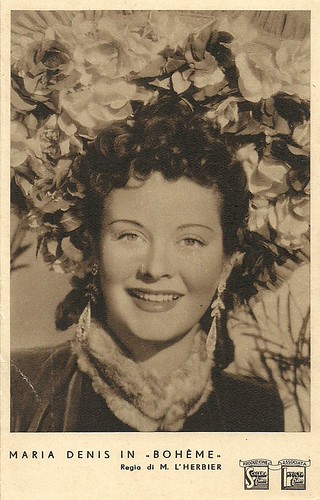
Italian postcard. Maria Denis as Mimi in La Vie de bohème/La Bohème/Bohème (Marcel L'Herbier, 1942-1945).

Italian postcard by Alterocca, Terni, 1941, no. 5840. Photo: Pesce / Generalcine.

Italian postcard by Ed. Tensi. Photo: Bertazzini, Torino. Maria Denis and director Ferdinando Maria Poggioli, who directed Denis in Addio giovinezza, L'amore che canta and Sissignora. This card could perhaps refer to Sissignora.
Sources: John Francis Lane (The Guardian), France-it (IMDb), MovieMail (now defunct), Wikipedia (Italian) and IMDb.
This post was last updated on 22 December 2023.
No comments:
Post a Comment